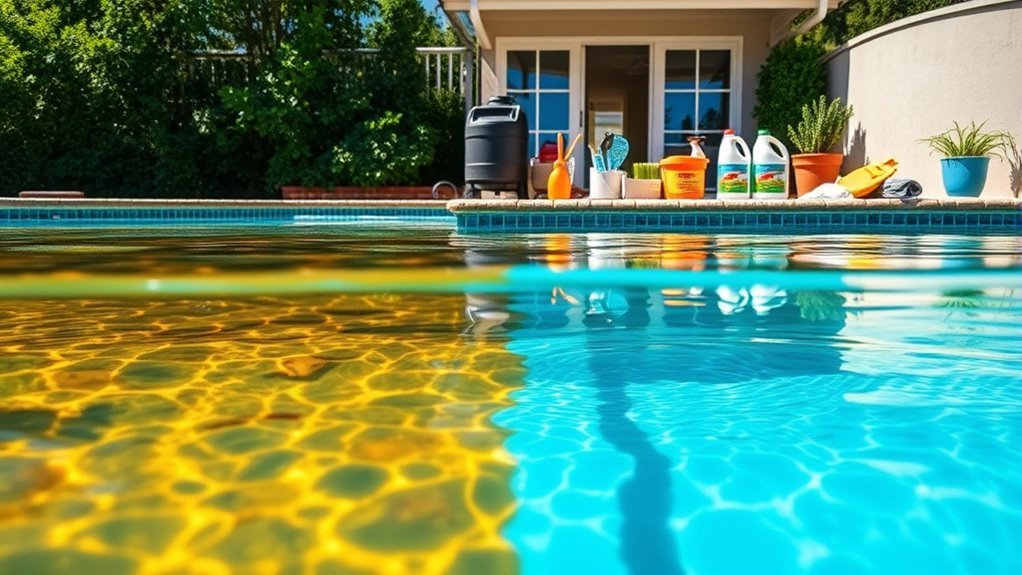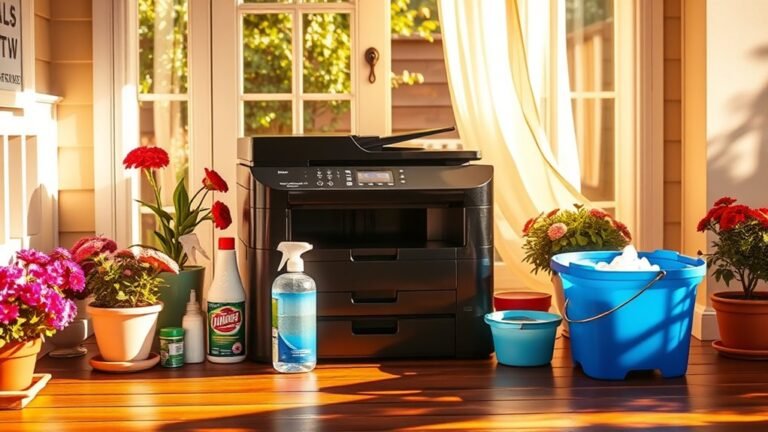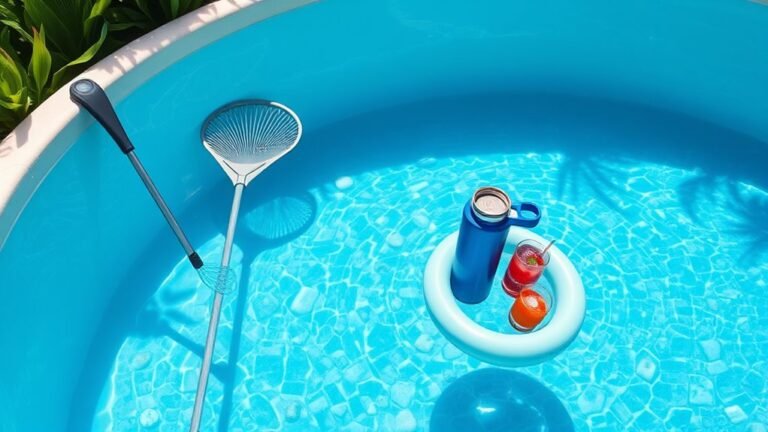How to Clear Brown Pool Water Fast
To clear brown pool water fast, start by testing your water chemistry for imbalances that may be causing discoloration. Remove leaves and debris, and guarantee your filtration system is functioning well. Use a pool skimmer and vacuum for thorough cleaning. Shock the pool with chlorine and add algaecide if necessary. Run your pump for at least eight hours to circulate the chemicals effectively. Following these steps will set you on the right path for maintaining clarity and cleanliness. Discover more techniques for lasting results.
##
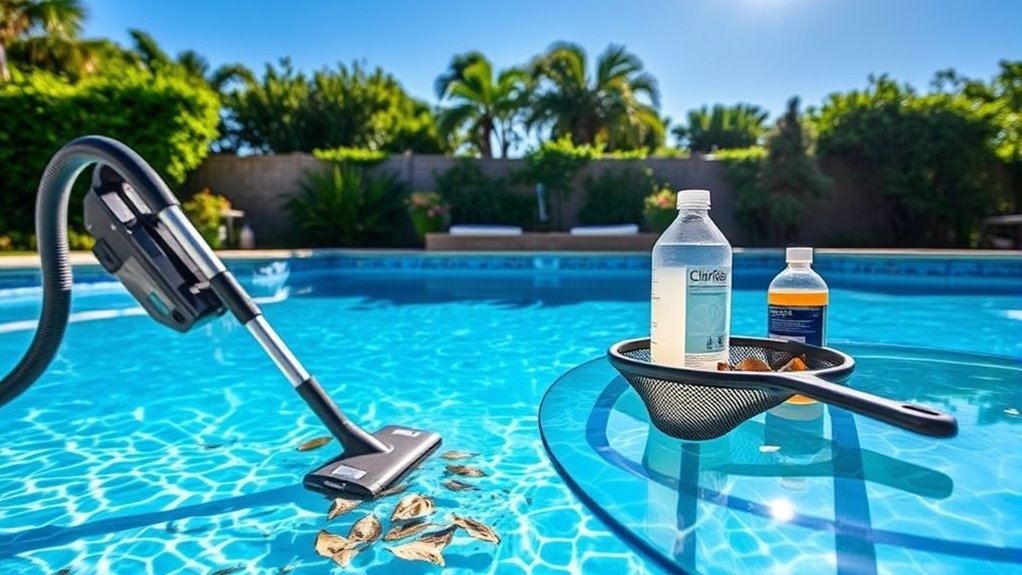
If you’re grappling with the frustrating issue of brown pool water, you’ve come to the right place for answers. This article will guide you through the essential steps to identify the root causes of discoloration, whether it be due to imbalanced water chemistry or insufficient maintenance practices. We’ll explore how high levels of metals like iron and copper, along with organic debris such as leaves and algae, can tarnish your pool’s appearance. Additionally, you’ll learn the importance of regular water testing and effective cleaning techniques to restore your pool’s clarity. By the end of this article, you’ll be equipped with the knowledge and strategies needed to transform your brown pool water into a sparkling oasis that beckons relaxation and enjoyment.
Preparation For Cleaning
Before you begin the cleaning process, it’s important to prepare properly to guarantee effective results. Adequate preparation sets the stage for successful pool maintenance and guarantees you tackle the brown water issue efficiently. Here’s what you need to do:
Proper preparation is essential for effective pool cleaning, ensuring successful maintenance and efficient tackling of brown water issues.
- Conduct water testing: Use a reliable test kit to analyze pH, alkalinity, and chlorine levels. This information is essential for determining the appropriate treatment.
- Remove debris: Clear your pool of leaves, twigs, and other debris. This prevents further contamination and makes the cleaning process smoother.
- Check equipment: Inspect your filtration system and pumps to confirm they’re functioning properly. Malfunctioning equipment can hinder your cleaning efforts.
Tools and Chemical Required

To effectively clear brown pool water, you’ll need a specific set of tools and chemicals that will aid in restoring clarity. Here’s a concise overview of what you’ll require:
| Tools | Chemicals | Purpose |
|---|---|---|
| Pool Skimmer | Pool Shock | Eliminates contaminants and clarifies water |
| Vacuum | Algaecide | Targets algae growth |
| Filter Cleaner | pH Balancer | Maintains ideal water chemistry |
Using pool shock will help to break down organic material, while filter cleaning guarantees that your filtration system operates efficiently. Gather these items before you start your cleaning process to pave the way for a sparkling pool.
How to Clean:
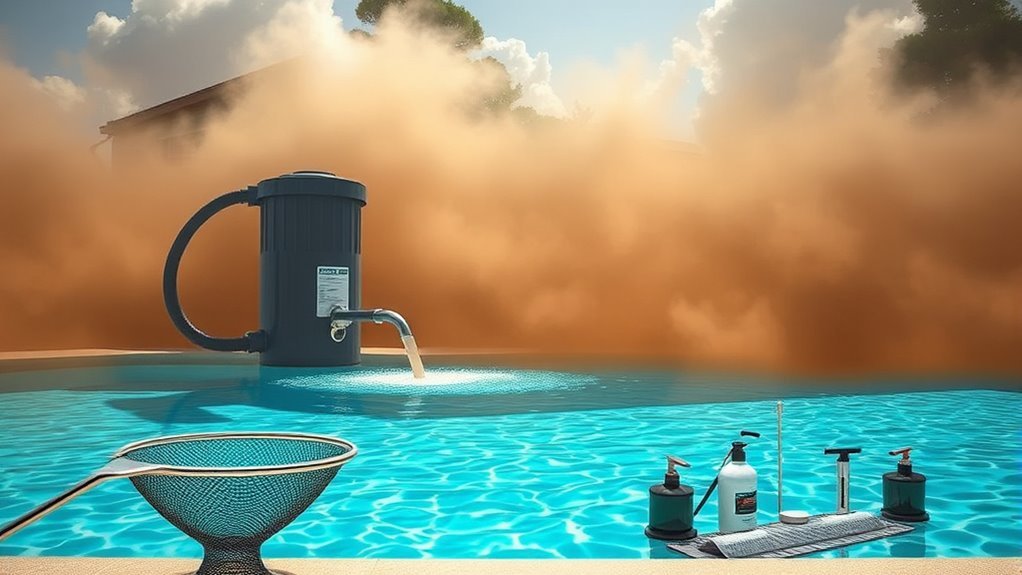
Step 1: Check Pool Filtration
- Inspect the Filter: Begin by examining your pool filter to ensure it is clean and operating correctly. A clogged or malfunctioning filter can significantly hinder your pool’s ability to remove contaminants.
- Clean the Filter: If necessary, clean or backwash your filter according to the manufacturer’s instructions. Regular maintenance will enhance its effectiveness.
- Monitor Filter Operation: Ensure the filter runs for the recommended amount of time each day, typically 8-12 hours, to maintain optimal water clarity.
Step 2: Balance Water Chemistry
- Test Water Parameters: Use a pool water testing kit to measure the pH, alkalinity, and chlorine levels. Ideal pH ranges from 7.2 to 7.6, while alkalinity should be between 80-120 ppm.
- Adjust Chemical Levels: If any parameters are out of balance, add the appropriate chemicals to adjust them. For example, add pH increaser or decreaser as needed, and use alkalinity increaser if levels are low.
- Chlorine Levels: Ensure that chlorine levels are between 1-3 ppm for effective sanitation. If levels are low, add chlorine tablets or liquid chlorine to boost sanitation.
Step 3: Shock Your Pool
- Select a Chlorine Shock: Choose a suitable chlorine shock treatment, often in granular or liquid form, specifically designed to tackle algae and bacteria.
- Follow Instructions: Carefully read and follow the manufacturer’s instructions for dosage based on your pool size. Generally, you’ll want to add enough shock to raise chlorine levels to 10 times the combined chlorine reading.
- Disperse the Shock: Pour the shock treatment into the pool while walking around the perimeter to ensure even distribution. Avoid adding shock directly to the skimmer or in concentrated amounts in one spot.
- Allow Time to Circulate: Run the pool pump for at least 8 hours after shocking to ensure that the chemicals circulate thoroughly and effectively eliminate contaminants.
Safety Consideration
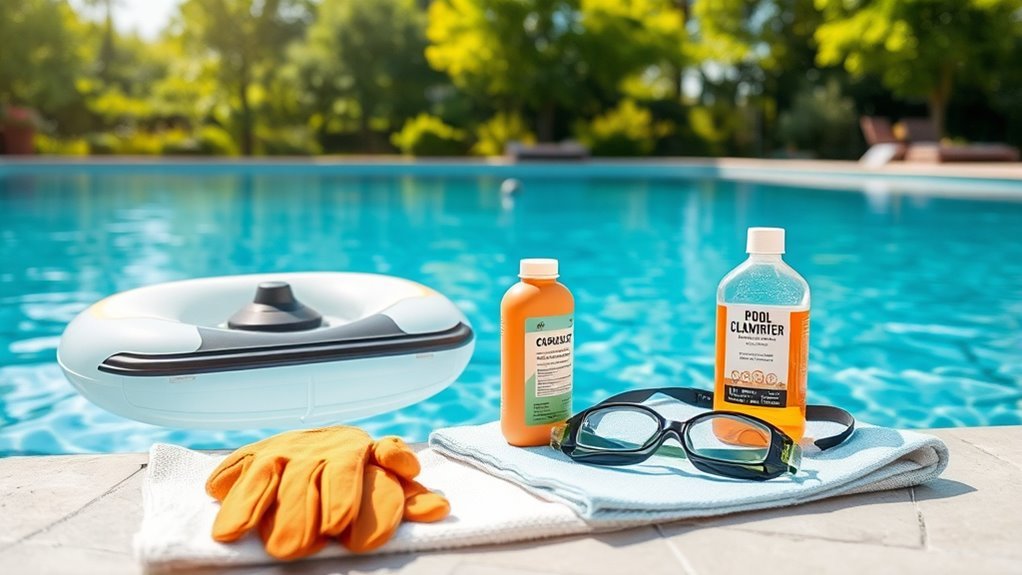
While addressing brown pool water, it’s important to prioritize safety to guarantee a smooth and secure cleaning process. You should always wear protective gear, such as gloves and goggles, when handling pool chemicals. These substances can be hazardous, and proper chemical handling is critical to prevent injuries. Make sure your work area is well-ventilated, and avoid mixing chemicals, as this can produce dangerous reactions.
Additionally, test the water chemistry before diving in. Maintaining water safety is essential for both your health and that of swimmers. If you’re unsure about any chemical’s safety, consult the product label or a professional. By taking these precautions, you can effectively clear brown water while keeping yourself and others safe.
Tips to keep clean for long time
Once you’ve secured safety and cleared the brown water, maintaining a clean pool for the long term requires consistent care and attention. Here are some essential tips:
- Regular Testing: Test your water chemistry at least once a week. This guarantees balanced pH and chlorine levels, preventing algae growth.
- Preventative Maintenance: Schedule routine cleaning and servicing for your filtration system. This minimizes the chances of dirt accumulation and enhances water clarity.
- Skimming and Brushing: Daily skimming and weekly brushing help remove debris and prevent buildup on surfaces, keeping your pool inviting.
Frequently Asked Questions
How Long Does It Take to Clear Brown Pool Water?
Clearing brown pool water can take anywhere from a few hours to several days, depending on the clearing methods you use and the treatment duration required. If you’re using a flocculant, expect quicker results, while shock treatments may take longer. Regular testing and balancing your pool’s chemicals can also speed up the process. Ultimately, your approach will determine how swiftly and effectively you can restore your pool’s clarity and enjoy it again.
Can I Swim While Treating Brown Pool Water?
You shouldn’t swim while treating brown pool water. Swimming safety is paramount, as treatment methods often involve chemicals that can irritate skin and eyes. Additionally, these chemicals need time to work effectively without interference. It’s best to wait until the water clears and treatment levels stabilize before diving in. Always check the chemical balance and verify it’s safe for swimming before you take that invigorating plunge. Your health is worth the wait!
What Causes Brown Water in Pools?
Think of your pool as a delicate ecosystem; when water chemistry goes awry, it can turn brown. This discoloration often stems from factors like algae growth, high metal content, or insufficient filtration. Poor pool maintenance, including infrequent cleaning and unbalanced chemicals, exacerbates the problem. By regularly testing and adjusting your water chemistry, you can maintain clarity and enjoy a sparkling oasis, free from the murky depths that threaten your pool’s beauty.
Is Brown Water Harmful to Swimmers?
Brown water in pools can pose risks to swimming safety, as it often indicates poor water quality. While it might not be directly harmful, it can harbor bacteria and other contaminants, increasing the chance of skin irritations or infections. Additionally, murky water can obscure hazards, making it difficult to see swimmers or objects. To guarantee a safe swimming experience, it’s vital to address brown water promptly and maintain proper pool hygiene.
Can I Use Natural Remedies to Clear Brown Water?
Yes, you can use natural remedies to clear brown water. While chemical treatments often deliver quick results, natural clarifiers like diatomaceous earth and vinegar solutions provide a gentler alternative. Vinegar can help balance pH levels, while natural clarifiers bind particles, making them easier to filter out. Though these methods may take longer, they offer a safer, eco-friendly way to restore your pool’s clarity without harsh chemicals, giving you peace of mind and freedom from synthetic additives.
